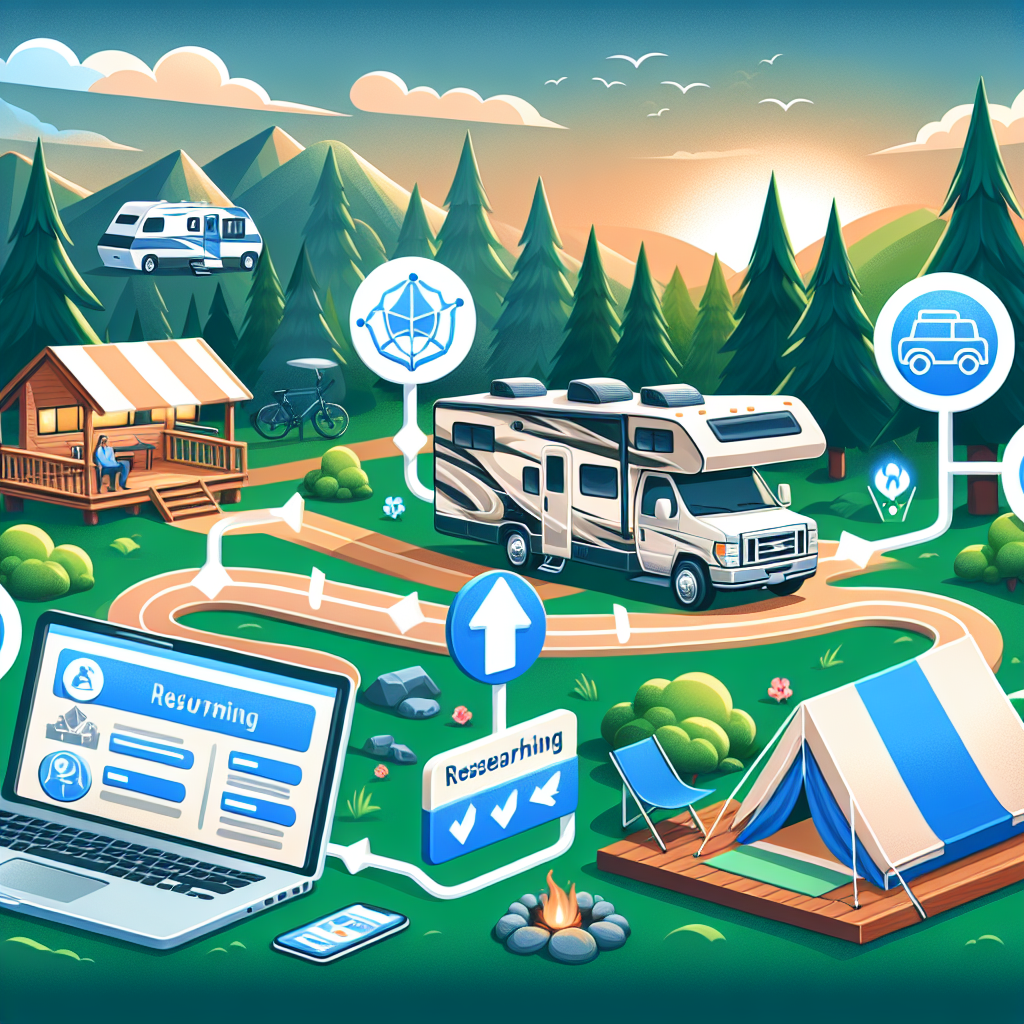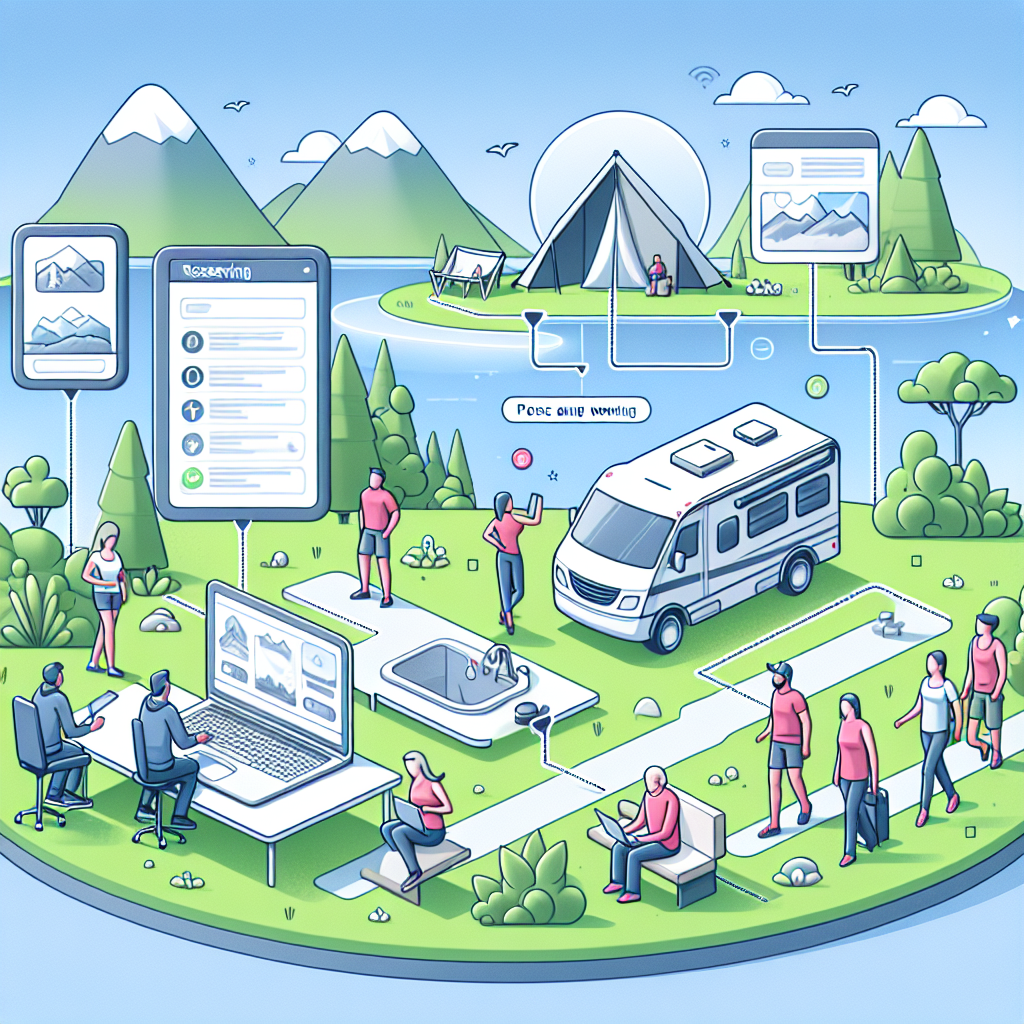If you’re an adventure enthusiast looking to hit the open road and explore breathtaking natural landscapes, finding and reserving the perfect RV campsite is crucial to ensuring a memorable trip. But with an overwhelming number of options available, it can be challenging to navigate through the sea of possibilities. That’s why we’re here to help you discover the best techniques and resources to effortlessly find and reserve RV campsites that perfectly align with your preferences and needs. From hidden gems tucked away in serene forests to beachside havens with stunning ocean views, we’ve got you covered. Let’s embark on a journey of exploration and uncover the secrets of finding and reserving the ultimate RV campsites.
Researching RV Campsites
When it comes to finding and reserving RV campsites, doing your research is key. There are several factors to consider in order to choose the right location for your needs.
Choosing the Right Location
The first step in researching RV campsites is to determine the right location for your trip. Consider factors such as proximity to your desired destination, access to amenities, and the overall vibe of the campground. Whether you’re looking for a secluded spot in nature or a campground with plenty of activities, there are options for everyone.
Checking for Amenities
Once you’ve narrowed down your preferred location, it’s important to check for the amenities that are important to you. Are you looking for full hookups, including water, electricity, and sewer? Do you need access to laundry facilities or a campground with Wi-Fi? Make a list of the amenities that are essential for your comfort and convenience.
Reading Reviews
Another valuable research tool is reading reviews from fellow RVers. There are many websites and online forums where campers share their experiences and provide honest feedback about different campgrounds. Reading reviews can give you insight into the quality of the facilities, the cleanliness of the campground, and the friendliness of the staff.
Considering Accessibility
Lastly, don’t forget to consider the accessibility of the campsite. If you have a large RV or specific requirements, such as wheelchair accessibility, it’s important to ensure that the campground can accommodate your needs. Look for information about the size of the campsites, the width of the roads, and any accessibility amenities that may be available.
Using Campground Directories and Websites
Once you have an idea of what you’re looking for in an RV campground, it’s time to turn to campground directories and websites to narrow down your options.
Campground Directories
Campground directories provide a comprehensive list of campgrounds across the country. These directories often include information about the amenities, rates, and contact information for each campground. The directories may be available in print or online, making it easy to browse through and compare different options.
Online Campsite Reservation Websites
In addition to campground directories, there are also online campsite reservation websites that allow you to search for and book RV campsites. These websites typically provide detailed information about each campground, including photos, amenities, and availability. Many of these websites also offer user reviews, allowing you to get a better idea of the overall experience at each campground.
RV Park Apps
For those who prefer to use their smartphones or tablets, there are also RV park apps available. These apps often provide similar functionality to online campsite reservation websites, allowing you to search for, compare, and book RV campsites directly from your device. Some apps also offer additional features, such as GPS navigation to help you find your chosen campground.

Contacting Campgrounds
Once you’ve narrowed down your options and selected a few potential campgrounds, it’s time to reach out to the campgrounds directly to gather more information and make a reservation.
Calling Campgrounds
One of the most direct ways to contact a campground is by phone. Calling the campground allows you to speak directly with a staff member who can answer any questions you may have. It’s a great opportunity to inquire about specific amenities, ask about availability, or even negotiate rates. Plus, speaking with someone directly can give you a sense of the campground’s customer service.
Emailing Campgrounds
If you prefer written communication or have a lengthy list of questions, emailing the campgrounds is a convenient option. By sending an email, you can provide specific details about your needs and receive a detailed response. Email communication also allows you to keep a written record of your reservation and any correspondence with the campground.
Using Online Contact Forms
Many campgrounds have online contact forms on their websites, making it easy to quickly reach out to them. These contact forms typically require you to enter your name, email address, and a message. It’s a convenient option if you prefer not to call or email, and you can expect a response via email within a reasonable time frame.
Understanding Reservation Systems and Policies
Before finalizing your reservation, it’s important to have a clear understanding of the reservation systems and policies in place at each campground.
Reservation Requirements
Different campgrounds may have varying reservation requirements. Some may require a minimum stay, while others may have restrictions on the length of stays during peak seasons. It’s important to review the reservation requirements of each campground to ensure that you meet their criteria.
Payment Methods
When it comes to paying for your reservation, campgrounds may accept different payment methods. Some may require a deposit upfront, while others may require full payment at the time of booking. Make sure to inquire about the accepted payment methods so that you’re prepared to complete your reservation.
Cancellation and Refund Policies
Life can be unpredictable, and sometimes plans change. It’s important to understand the cancellation and refund policies of the campgrounds you’re considering. Some campgrounds may have strict cancellation policies with limited refunds, while others may offer more flexibility. Knowing the policies in advance can help you make an informed decision.
Minimum Stay Policies
If you have a specific travel itinerary or limited vacation time, it’s important to consider the minimum stay policies of campgrounds. Some campgrounds may require a minimum stay of several nights, particularly during peak seasons or holidays. Be sure to check these policies to ensure that they align with your travel plans.

Planning and Booking in Advance
To secure your preferred RV campsite, it’s often necessary to plan and book in advance, especially during peak seasons and popular holiday periods.
Peak Season Considerations
During peak seasons, demand for RV campsites can be high. As a result, it’s important to plan ahead and make your reservations early to secure your preferred dates and locations. This is particularly true for popular destinations or campgrounds with limited availability.
Holiday and Event Periods
If you’re planning to travel during holidays or attend special events, it’s essential to plan and book your RV campsite well in advance. These periods tend to be high-demand, and campsites can fill up quickly. By booking early, you can ensure that you have a spot and avoid the disappointment of being turned away.
Availability Calendars
Before booking your RV campsite, it’s a good idea to check the availability calendars provided by campgrounds or online reservation websites. These calendars will show you the dates that are already booked and the remaining available dates. By reviewing the availability calendar, you can determine if your desired dates are still open or if you need to consider alternate options.
Booking Early for Popular Destinations
For popular destinations, it’s crucial to book your RV campsite as early as possible. These destinations often have limited campground options, and spots can fill up quickly. By securing your reservation early, you can ensure that you have a place to stay and avoid the disappointment of being left without a campsite.
Exploring Alternative Camping Options
While traditional campgrounds are popular, there are also alternative camping options that may suit your preferences or travel plans.
National and State Parks
National and state parks are a great option for RV camping, offering beautiful scenery and a wide range of amenities. These campgrounds often have limited spots, especially in popular parks, so it’s important to book in advance. However, they typically provide a more natural and scenic setting compared to private campgrounds.
Private Campgrounds
Private campgrounds offer a variety of amenities and services, making them a popular choice for RVers. These campgrounds often have a range of facilities, including pools, playgrounds, and laundry facilities. They also tend to be more conveniently located near popular tourist destinations.
Boondocking and Dry Camping
For those seeking a more off-the-grid experience, boondocking and dry camping may be the way to go. Boondocking, also known as dispersed camping, allows you to camp in undeveloped areas without any hookups. Dry camping, on the other hand, typically refers to camping in designated areas without hookups, but with amenities like pit toilets or water sources.
Dispersed Camping
Dispersed camping, as mentioned previously, involves camping in undeveloped areas. These areas may be located in national forests, on Bureau of Land Management (BLM) land, or other public lands. Dispersed camping is often free or requires a low fee, but it typically doesn’t provide any amenities or facilities.

Joining Recreational Vehicle Clubs
If you’re an avid RVer, joining a recreational vehicle club can provide you with a range of benefits and additional options for finding and reserving RV campsites.
Benefits of RV Clubs
RV clubs offer a variety of benefits, including access to exclusive campgrounds, member discounts, and special events. Being a part of an RV club can enhance your RVing experience and provide opportunities to meet fellow RVers with similar interests.
Access to Exclusive Campgrounds
Many RV clubs have their own exclusive campgrounds, which may offer unique amenities and a more intimate community experience. These campgrounds can provide a sense of camaraderie among members and often have additional activities and events specifically tailored to RVing enthusiasts.
Member Discounts
Another advantage of joining an RV club is the potential for member discounts. These discounts may apply to campground fees, RV accessories, or even fuel purchases. Being a member of an RV club can help you save money and make your RVing experiences more affordable.
Reservation Assistance
Some RV clubs offer reservation assistance to their members. This can be particularly helpful if you’re planning a trip to a popular destination or during peak season. The club may have connections with campgrounds or access to reserved campsites, making it easier for you to secure your desired RV campsite.
Considering RV Park Membership Programs
In addition to RV clubs, there are also RV park membership programs that offer a range of benefits and opportunities for RVers.
Types of RV Park Memberships
RV park membership programs typically fall into two main categories: discount programs and ownership programs. Discount programs provide members with discounted rates at participating campgrounds, while ownership programs offer the opportunity to purchase a membership that provides long-term access to specific campgrounds.
Membership Costs and Benefits
When considering RV park membership programs, it’s important to evaluate the costs and benefits involved. Some membership programs require an upfront fee or annual dues, while others may have a one-time purchase cost. Take the time to compare the costs with the potential savings and benefits to determine if a membership program is right for you.
Membership Campgrounds
RV park membership programs often have a network of affiliated campgrounds where members can stay. These campgrounds typically offer a range of amenities and services exclusive to members. By being a member of a membership program, you can access a variety of campgrounds across the country and enjoy the perks of belonging to a larger RVing community.

Using Social Media and Forums
Social media and online forums can be valuable resources for finding and reserving RV campsites, as well as seeking recommendations and tips from fellow RVers.
RVing Social Media Groups
There are numerous social media groups dedicated to RVing and camping. These groups provide a platform for RVers to connect, share experiences, and offer advice. Participating in these groups can help you gather information about specific campsites, ask for recommendations, and even find out about last-minute availability or cancellations.
Online RVing Forums
Online RVing forums are another great resource for finding and reserving RV campsites. These forums allow RVers to ask questions, seek recommendations, and share their own experiences. You can browse through the threads to find discussions about different campgrounds or start your own thread to get personalized input from fellow RVers.
Seeking Recommendations and Tips
Social media groups and online forums are excellent places to seek recommendations and tips from experienced RVers. Whether you’re looking for a hidden gem campground or advice on navigating a particular reservation system, there are RVers out there who have likely been in the same situation and are eager to help.
Being Flexible and Willing to Adjust
While it’s important to plan and book in advance, it’s also essential to remain flexible and willing to adjust your plans when needed.
Alternate Dates and Locations
If your preferred RV campsite is fully booked for your desired dates, consider exploring alternate dates or locations. Sometimes shifting your travel plans slightly can open up availability and allow you to experience different destinations or campgrounds.
Partial Bookings
If a campground has limited availability or requires a minimum stay that doesn’t align with your plans, consider making a partial booking. This means reserving the available days and then keeping an eye out for cancellations or availability during adjacent dates. By doing so, you may be able to secure a longer stay or the dates you initially wanted.
Last-Minute Deals
If you have a more flexible schedule, keep an eye out for last-minute deals on RV campsites. Campgrounds sometimes offer discounted rates for last-minute bookings or have cancellations that become available. By staying flexible, you can take advantage of these deals and potentially save money on your RV camping adventures.
Area Day-Use Passes
If you’re unable to secure a campsite reservation or prefer not to stay overnight, consider purchasing a day-use pass for the campground or nearby recreational areas. Day-use passes allow you to enjoy the amenities and activities available at the campground during the day without staying overnight. This can be a great alternative if you’re in the area and want to spend some time exploring the campground.
Finding and reserving RV campsites can be an exciting part of planning your RVing adventures. By researching different locations, utilizing campground directories and websites, contacting campgrounds directly, understanding reservation systems and policies, planning and booking in advance, exploring alternative camping options, joining RV clubs, considering RV park membership programs, using social media and forums, and remaining flexible, you can ensure a smooth and enjoyable experience every time you hit the road in your RV. Happy camping!



